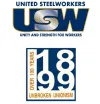This week in labor history: December 19-25

DECEMBER 19
1907 – An explosion in the Darr Mine in Westmoreland Co., Pa., kills 239 coal miners. Seventy-one of the dead share a common grave in Olive Branch Cemetery. December 1907 was the worst month in U.S. coal mining history, with more than 3,000 dead.
1983 – A 47-day strike at Greyhound Bus Lines ends with members of the Amalgamated Transit Union accepting a new contract containing deep cuts in wages and benefits. Striker Ray Phillips died during the strike, run over on a picket line by a scab Greyhound trainee.
1984 – Twenty-six men and one woman are killed in the Wilberg Coal Mine Disaster near Orangeville, Utah. The disaster has been termed the worst coal mine fire in the state’s history. Federal mine safety officials issued 34 safety citations after the disaster but had inspected the mine only days before and declared it safe.
DECEMBER 20
1899 – Delegates to the AFL convention in Salt Lake City endorse a constitutional amendment to give women the right to vote.
1906 – The first group of 15 Filipino plantation workers recruited by the Hawaiian Sugar Planters Association arrive in Hawaii. By 1932 more than 100,000 Filipinos would be working in the fields.
2005 – Thousands of workers began what was to be a two-day strike of the New York City transit system over retirement, pension and wage issues. The strike violated the state’s Taylor Law. TWU Local 100 President Roger Toussaint was jailed for 10 days and the union was fined $2.5 million.
DECEMBER 21
1790 – Powered by children seven to 12 years old working dawn to dusk, Samuel Slater’s thread-spinning factory goes into production in Pawtucket, R.I., launching the Industrial Revolution in America. By 1830, 55 percent of the mill workers in the state were youngsters, many working for less than $1 per week.
1921 – Supreme Court rules that picketing is unconstitutional. Chief Justice (and former president) William Howard Taft declared that picketing was, in part, “an unlawful annoyance and hurtful nuisance…”
DECEMBER 22
1897 – A group of building trades unions from the Midwest meet in St. Louis to form the National Building Trades Council. The Council disbanded after several years of political and jurisdictional differences.
1901 – Twenty-one Chicago fire fighters, including the chief, died when a building collapsed as they were fighting a huge blaze at the Union Stock Yards. By the time the fire was extinguished, 26 hours after the first alarm, 50 engine companies and seven hook-and-ladder companies had been called to the scene. Until Sept. 11, 2001, it was the deadliest building collapse in American history in terms of fire fighter fatalities.
1919 – Amid a widespread strike for union recognition by 395,000 steelworkers, approximately 250 alleged “anarchists,” “communists,” and “Labor agitators” were deported to Russia, marking the beginning of the so-called “Red Scare.”
DECEMBER 23
1908 – AFL officers are found in contempt of court for urging a Labor boycott of Buck’s Stove and Range Co. in St Louis, where the Metal Polishers were striking for a nine-hour day.
1970 – Construction workers top out the North Tower of the World Trade Center at 1,368 feet, making it the tallest building in the world.
2008 – Walmart Stores Inc., the nation’s largest employer, with 1.4 million “associates,” agrees to settle 63 wage and hour suits across the U.S., for a grand total of between $352 million and $640 million. It was accused of failure to pay overtime, requiring off-the-clock work, and failure to provide required meal and rest breaks .
DECEMBER 24
1913 – Seventy-two copper miners’ children die in panic caused by a company stooge at Calumet, Mich., who shouted “fire” up the stairs into a crowded hall where the children had gathered. They were crushed against closed doors when they tried to flee.
DECEMBER 25
1910 – A dynamite bomb destroys a portion of the Llewellyn Ironworks in Los Angeles, where a bitter strike was in progress.
1967 – Fourteen servicemen from military bases across the U.S., led by Pvt. Andrew Stapp, form The American Servicemen’s Union (ASU). The union, which never came close to being recognized by the government, in its heyday during the Viet Nam war claimed tens of thousands of members and had chapters at bases, on ships and in Viet Nam. ASU demands included the right to elect officers.
(Compiled by David Prosten, founder of Union Communication Services)
